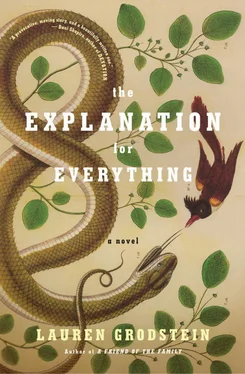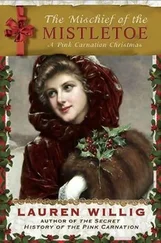“Yeah, but—”
“Do you guys want to play foosball?” Belle asked. They’d found a foosball table at a rummage sale the previous weekend, set it up in the corner of the living room.
“Argh,” said Rachel, who could see she was getting nowhere. Jeremy, who was short and malnourished-looking (all those chicken nuggets) followed the girls out of the room. And then Andy was alone with Sheila, in his house. Outside, the crab apple tree was just starting to shed.
He turned to the sink, began washing the pans.
“I haven’t seen you much,” she said, picking up a plate and ferrying it to sink.
“You don’t have to do that,” he said, taking the plate from her hands. They were standing under the light by the sink, but the moody darkness was all around them, and Andy suddenly felt alarmed by how poor the lighting was in this room. Surely he could buy some lamps, some better bulbs.
“I just wanted to make sure—make sure everything was okay.”
“Of course it is,” Andy said. “Why wouldn’t it be?”
She ferried another plate. “I don’t know,” she said, disingenuous. “I just wanted to check.”
“Everything’s great,” he said. He felt all the small good parts of his day vanishing, dinner, the rousing speech to Lionel, so that when he fell asleep later that night all he would be left with would be Sheila’s pinched face and the guilt blooming in his stomach. Although why be guilty? Sure, he’d never had much of a swinging bachelorhood but he was fairly sure this was how it worked, that men and women could have sex with one another casually and still be friends later. Or had he blown it? Was he supposed to have asked her out to dinner? Was he supposed to have proposed marriage? Was he supposed to be haunted?
Sheila, in the pool of light, looked resigned. She was actually prettier than he gave her credit for.
“Really,” he said. “I’ve just been busy—I’ve been trying to finish this NSF grant, but I need to complete a few more studies first.”
“How’s it going?” she asked. The table was clear, the plates were in the dishwasher, and Sheila seemed unsure what to do next. She leaned against a counter. “Your research?”
He motioned her to sit. “Do you want decaf? If I make some? It’s going—well, it’s been challenging lately.” He rarely made coffee after dinner but he felt a need to keep moving. “I thought I’d discovered a protein differentiation that explained why certain alcoholic mice were driven to drink past inebriation. Other studies had suggested something similar, so I thought I was on the right track, but now I’m not so sure. My experiments aren’t going the way I’d hoped.”
“What would that mean?” she asked. “If your experiment works?”
“Something we’ve long suspected but is hard to confirm,” Andy said. “That there are differences—key differences—in the way alcoholic brains metabolize ethanol.”
“Like mine.”
“Well, I don’t know about yours,” he said. He scooped out the decaf, turned on the coffeemaker. “We can’t necessarily correlate what happens with mouse brains and human brains. I mean, mice are a fair representation of human brains, but I wouldn’t want to make any leaps about your brain from what I did in my lab today. Unless you want me to dissect you.”
“What?”
He laughed a little at his own awkwardness. “Do you want anything in your coffee?”
“Black is fine.” He delivered their coffees and sat down across from her, played with a splotch of dried marinara with his thumb. “The idea of your research,” Sheila said, “is that alcoholic brains function differently from nonalcoholic brains.”
“Right.”
“And you don’t think that simply feeding them endless amounts of alcohol might change the way their brains work?”
“You mean am I turning them into alcoholics?” Andy shook his head. “I don’t think so. These are mice who should drink as much as I can give them.”
“But what if you never gave them any? I mean the alcoholic ones, what if you just kept them away from the sauce? Would their brains change? Would they be like normal mice?”
“I don’t know,” Andy said. “I haven’t tried that.”
“So you’re just assuming they’re the way they are because that’s the only way you can see them?”
If she was getting at something deeper here, Andy wasn’t interested. The research he was conducting was a basic study of the mechanisms of certain neuropeptides, which eventually, he hoped, might lead to a better understanding of brain chemistry under the influence of alcohol. Of course he had long stopped expecting that it would lead to a bigger or more prestigious job for himself, but he thought that maybe his own small work might help future scientists figure something out down the road. The work was important to him. He wanted to understand the mechanism of the alcoholic brain.
Sheila was fiddling with the Claddagh ring she wore in place of a wedding band. “I don’t know much about the genetics here—I mean, I didn’t study biology or anything—but, you know, nobody else in my family is an alcoholic.”
“That doesn’t necessarily—”
“And I’m not entirely sure that if certain things in my life hadn’t happened—look, alcohol is a cheap and easy way of feeling better. Right? Things happened to me and I needed to feel better cheaply and easily.”
“Sheila, this isn’t about you.”
“Let me finish,” she said. “I had a small son at home. I didn’t have time or inclination to go to therapy. I tried taking some Prozac but it made me nauseous and it didn’t help—”
“Sheila, seriously, my research isn’t about you.”
“How could you say that?” She laughed, but the laugh sounded bitter, which was unlike Sheila. And he knew and hated the idea that she was bitter about him, about his behavior. “Of course your research is about me.”
He sighed. “It’s not. I started it before we even met.”
“Not me specifically, Andy, but it’s about me, or people like me. Right? You want to stick alcoholics in a box, say they are the way they are because of their genes, so that me and everyone else in AA and the guy who killed your wife, you can make some kind of simple sense of us, and I get that—”
“Don’t,” Andy said, surprised to feel his heart pound.
“Why not?” she said. She pushed her coffee mug on the table with one hand, then pushed it the other way with the other.
“Because my research is about more than just one person. Or even a group of people. It’s about the brain.” He wished he was better at explaining this. It was hard for laypeople to separate biology from sociology, he knew that, but still he wished Sheila had just a slightly more sophisticated understanding of the way animal research worked.
“I guess I’m just not comfortable with you extrapolating data from mice into a grand understanding of alcoholism.”
“You might not be comfortable with it,” Andy said, “but that’s science. In many ways mouse genes are a decent representation of our own, and if we experiment—”
“Mice don’t find pictures of their husbands on the Internet with their best friends—”
“Sheila—”
“Mice don’t find out their ex-husbands gave them syphilis.”
He blinked.
“Don’t worry, Andy. It was years ago. I took the antibiotics right away.”
She stood, took her mug to the coffeemaker, even though she didn’t need a refill. She put her hands on the counter. She had chipped pink polish on her fingers.
“Sheila, I’m sorry if my research makes you uncomfortable.”
She was still facing the other way. “Look, you don’t have to avoid me because you’re afraid it will be weird. It’s not going to be weird. We can still be friends.”
Читать дальше












